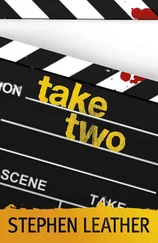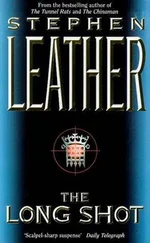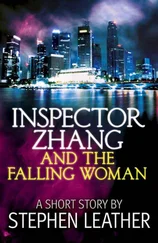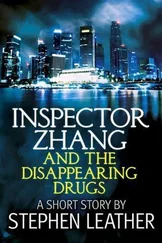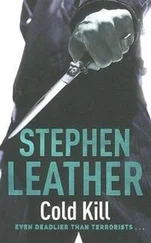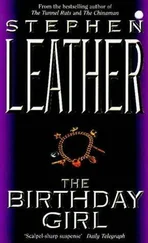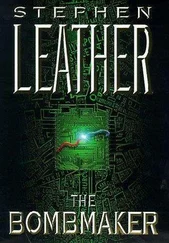Maybe they were heading down the slope because that was the best chance of finding water. Or maybe they wanted to move away from a direct route between the house and the clearing, figuring that he would be coming for them on foot. Van der Sandt screwed the top back on his water bottle and put it in its holster on his belt. It didn’t matter why they had chosen the route they’d taken. All that mattered was that he was on their trail. He started walking, following the tracks the men had left. They hadn’t made any effort to conceal their progress, but Van der Sandt was a good enough tracker that it wouldn’t have made any difference if they had.
CHAPTER 42
There were six of them in the back of the Mastiff, sweating from the heat as it bumped along the pot-holed road. The Mastiff was capable of ninety kilometres an hour, but it was going much slower – the road had been mined in the past so the two-man crew were driving on full alert. The six-wheeled Mastiff was festooned with armour plates and equipped with a 7.62 mm general purpose machine gun and a 40 mm grenade launcher. The dual air conditioners did their best to keep the temperature down, but Raj was still sweating. He was on patrol with B Company, 40 Commando, on his second tour of Afghanistan. They were based at Patrol Base One in the Nahri Saraj district of Helmand Province, in the south of the strife-torn country. The group had been tasked with training the local police in the village of Char Kutsa. The police had already undergone training at the base but the top brass had decided that they would benefit from extra training on their home turf.
Raj had been in the country for a month, and morale had fallen since his first tour, mainly because the troops knew that the fight had been lost and that they would be abandoning the country sooner rather than later. What they were doing was the equivalent of rearranging the deckchairs on the Titanic and everyone knew it. The Afghans they were instructing knew it too, and went through the training half-heartedly at best.
Raj had his SA80 assault rifle between his legs. Bob ‘Bugsy’ Malone, who was sitting next to him, had one of the new Sharpshooter rifles that had just been issued to 40 Commando. The new weapons were in short supply and were jealously guarded by those who had them. They fired a 7.62 mm round and were accurate up to eight hundred metres, perfect for longer-range firefights, which is how the enemy in Afghanistan tended to work. The Afghans weren’t great at fighting up close and personal; they preferred remotely operated IEDs or to fire from a distance behind cover. Raj wasn’t a fan of the new gun; the heavier round meant that it did more damage, but Raj was able to carry three of his Nato 5.56 rounds for every one that Bugsy had in his packs.
The only other member of the team with a Sharpshooter was their sergeant, Pete Kershaw, a big Geordie with a shaved head and a scar on his cheek that he’d picked up in Iraq ten years earlier. He claimed it was the result of fighting a Taliban warrior hand-to-hand, but Raj had heard from another medic that he’d tripped during a game of badminton and fallen against an ammo box. Kershaw had been transferred to Raj’s unit after the previous sergeant had been struck down with appendicitis and he had hit the ground running. He’d made it clear from the start that he didn’t like Raj, but as Raj was a surgeon lieutenant there wasn’t much he could do to show his disapproval other than to throw him the odd scornful look. Raj did know that Kershaw had been bad-mouthing him around the base, saying that doctors were no use in combat and should never be allowed out on patrol. Truth be told, it wasn’t a point of view that Raj could argue with. When it came to combat, his rank meant nothing. Kershaw had far more experience and the times they had come under fire, Raj had allowed the sergeant to call the shots.
The rest of the unit were carrying SA80s except for the youngest member, Mike Cross, a Liverpudlian with an almost childlike sense of humour, who had been issued with a combat shotgun. Cross was sitting next to Raj, and he too was sweating profusely.
They had been sitting in the Mastiff for the best part of forty minutes, and the further they had got from the base the slower they went. The Mastiff was covered with slat armour, a rigid slatted metal grid that was effective against RPG attacks, and the vehicle itself was sturdy enough to shrug off small arms fire and Kalashnikov rounds. It was also well protected against IEDs, but a large enough bomb planted under the road could overturn it, so the driving crew were keeping their eyes peeled.
‘Approaching the police station now, Sarge,’ shouted the driver, a stocky Scot called Alistair Turner who at some point in his military career had acquired the nickname Kevin because of his fondness for bacon.
The Mastiff came to a halt and Kershaw opened the rear door. ‘Right, everyone out,’ he said.
The men piled out of the vehicle. The sky was clear of clouds and the sun was close to its zenith. The police station had been built by an American construction company. It contained an office, an armoury, and half a dozen cells, most of which were usually occupied by Afghan cops napping between shifts. It had a flat roof with a communications mast and a satellite dish, and Raj had been told that the American Government had paid the contractors just over five million dollars for the work. It looked to Raj as if a team of half-competent builders could have thrown it up in about a week. Around it were old mud houses and new ones built from concrete breeze blocks. Women in full burkas shepherded their children inside while old men in dishdasha robes stood and stared at the soldiers with undisguised hostility.
The captain in charge of the Char Kutsa police was in his early thirties, dark-skinned and bearded. He was serious about his job and applied himself well, but his men were a motley crew, ill-disciplined and with a tendency to slope off for a sneaky cigarette given half the chance. There were eight of them and the captain was trying to get them lined up and at attention in front of their two black Ford Ranger pick-up trucks, also provided by the US Government. The men carried Hungarian-made AMD-65 Kalashnikov copies and had Russian-made 9 mm Makarov pistols in holsters on their hips. They were reasonable shots on the range but despite several weeks of training they were still a danger to themselves when taking on moving targets that could fire back. They had run numerous exercises at the camp, but the Marines had never felt confident enough to let the Afghans use live ammunition. It didn’t matter how many hours the cops spent practising, when confronted with a live target the Afghans reverted to ‘pray and spray’ and were more concerned about their own safety than taking out the hostiles. They had rehearsed clearing rooms and again their discipline was so bad that more often than not they’d end up shooting one of their own.
The captain came over, grinning. He was the only cop who could speak any English, and his language skills were rudimentary at best. Pretty much all communication was through the unit’s interpreter, a former schoolteacher called Ahmad. Ahmad’s school had been destroyed in a drone strike that had been aimed at a high-ranking Taliban fighter. Luckily there had been no children in the school at the time of the attack, but whereas there had been funds available to build the police station, no money had been found to rebuild the school. Ahmad had a wife and four children to feed so had asked for and been given a job with the British forces as an interpreter. The interpreters were regarded as prime targets by the jihadists who saw them as traitors to Islam.
Ahmad translated for the captain. The men were ready and eager to start their training. The plan was to carry out a few house-to-house searches and later in the day to set up a roadblock on the main highway. ‘Tell him they don’t look ready,’ growled Kershaw. ‘Get them lined up properly and tell them to have their weapons ready for inspection.’
Читать дальше

